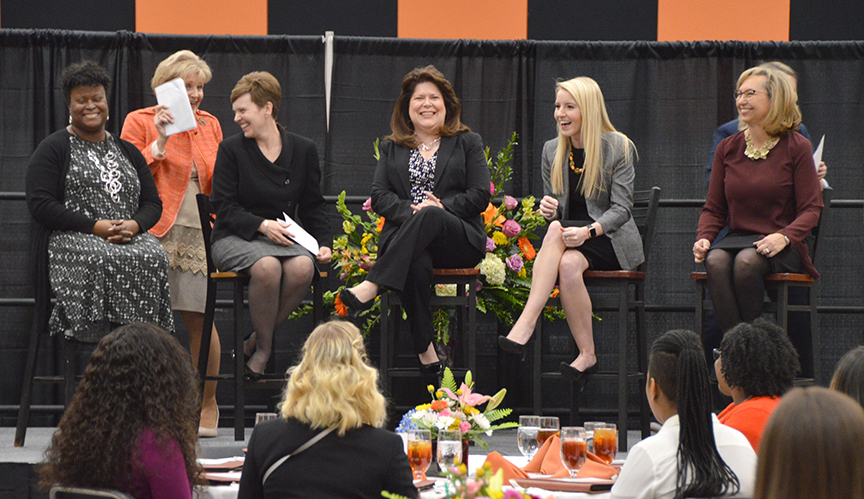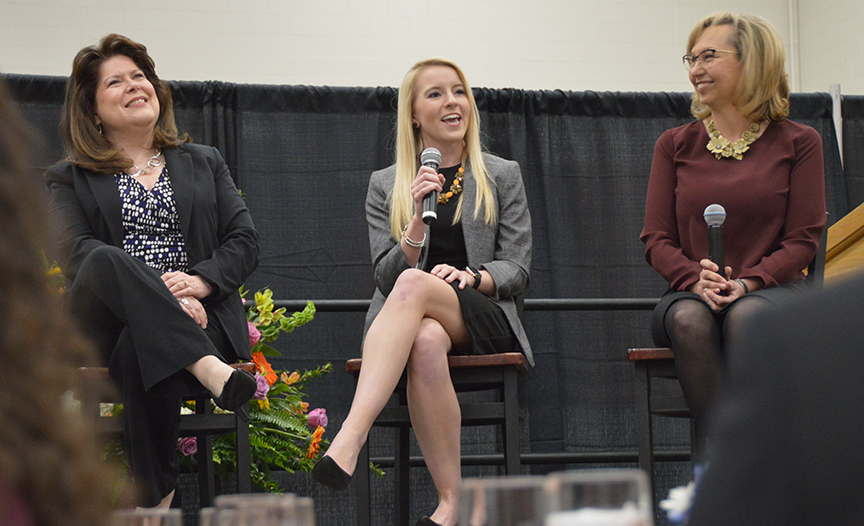Women in the United States have made considerable gains in education and work experience when compared to their male counterparts, yet pay parity remains a foreign concept in still too many professional fields. And the recent #MeToo movement — while monumental in providing a voice to those who’ve remained silent for too long — shows that we have a long way to go before workplace equality is the norm, rather than celebrated.
More than 100 female Campbell University students heard professional women — Campbell graduates and professors — share their stories of struggle and success at the first Women’s Leadership Conference on Friday in the Pope Convocation Center. Coordinated by Campbell Title IX Coordinator Kellie Nothstine and Campbell Athletics, the Summit not only provided the students valuable lessons in climbing the career ladder, but also one-on-one meetings with mentors eager to answer questions and offer sage advice.
“When I look back at my college days, there are so many things I wish a woman in the middle of her career could have shared with me,” said Nothstine, who joined Campbell in 2015. “I had this idea for a women’s leadership luncheon, in the very least, to take female students and match them up with a mentor in their fields. But then I wanted to broaden the conversation — this event became bigger as we got faculty, staff and alumni on board willing to not only talk about their careers, but also what it’s like to be a woman in the workforce today. From the #MeToo movement to sexual harassment, balancing work and a family and approaching salary negotiations.
“Women make less than men overall. But there are studies that show that for many, it’s because they just don’t ask for money. So how do you empower those women with more information and more confidence? That’s the goal of this [Summit].”
Friday’s Summit began with an introduction by Kathy Creed, wife of Campbell President J. Bradley Creed and a career educator and administrator for public schools in Texas and Louisiana. Creed shared her own experience going before an all-male school board in Texas to interview for a principal position (she was an assistant principal at the time). The school board, she said, focused on her husband, who was working toward his Ph.D. at the time.
“They asked me what I was going to do when my husband graduated and got a job in another state,” she said. “I said, ‘I’ll go with him. Just like any of you would go with your wife if she got a job in another state making [more than them]. None of the said a word, and I smiled. I got the job, but the battle was not over.”
Creed learned that her “raise” with her new position was $1,000, far below what a man would have made in the same role. She asked why the raise was so low with all of her new responsibilities, and the district replied with a more suitable offer.
“They were just seeing if I’d say something,” she told the crowd. “And I did. And that’s the lesson here — don’t be afraid to be in that conversation. Present your case, and good things can happen. Sometimes, just a little conversation will really help.”
Creed was followed by a five-woman panel featuring the Rev. Faithe Beam, dean of Spiritual Life and campus minister; Allison Sikes (’87), president and CEO of Rocky Mount-based Strategy Performance Business Solutions; Joy Henderson, director of postbaccalaureate studies at Campbell’s School of Osteopathic Medicine; Tara Wilson (’89), a former assistant district attorney and founder and owner of Lulu Max Jewelry; and Sue Ann Forrest (’16), lobbyist and assistant director of legislative and political action for the North Carolina Medical Society. Nancy Duffy, professor and director of the School of Nursing’s BSN program, ended the evening as keynote speaker.
Wilson shared her experience in the early 1990s working in the corporate offices of Home Depot. She said she was told by colleagues during her first week as a manager that she needed to “be a b—–, toughen up, don’t be nice, don’t smile and show some cleavage.” In her first meeting, three male managers made audible comments about her breasts.
“I was hired intentionally to change the culture of that company,” Wilson revealed. “I had the full backing of the president, the CEO and the board. And when I dealt with issues like that, they supported whatever I needed to do. I fired a lot of people that first year, a few of them my peers. We were equals, but they said the wrong things and didn’t work there anymore. Tough.”
Beam encouraged the young women to celebrate their accomplishments as women, something she wished she’d done earlier in her career.
“When I began as a campus minister, I wanted to focus on the ministry and what I would be doing for students, and I didn’t want to give attention to being the first woman in this position at Campbell,” Beam said. “I always dismissed that and didn’t give much weight to it. But in hindsight, I regret that, because it was monumental for a historically Baptist university to hire its first female campus minister. I wish I would have allowed myself to celebrate that. Sometimes we blaze a trail.”
More from the panel
Wilson: “I didn’t sleep last night thinking about this [summit], because public speaking is way out of my comfort zone. But did that stop me? Of course no. I learned to not let fear stop me. What’s the worst thing that can happen here? You don’t like what I say, and you move on. That’s OK. What’s the worst thing that can happen at work? You get fired? That’s OK, too. You’ll get another job.”
Forrest: “There will be times when you have to handle uncomfortable situations at work, and that’s unfortunate. But you will be making things better for the next woman who comes along.”
Forrest: “Find a tribe in your career field. Support each other, talk about issues and be aware of different situations within your careers. Find mentors to advise you specifically in your career. Get feedback from someone who’s been there, done that.”
Sikes: “As you learn to respect and connect with people, your actions will speak for you. Man or woman, no matter your background and where you’re from, your actions and your achievements speak for you.”
Sikes: “Don’t just think of yourself as a woman in the workplace. Think of yourself for your talents and gifts that God has given you. Think about the achievements you’ve made in your life and how you’re going to use your gifts to help other people.”
Sikes: “Professional self discipline and personal self discipline are two of the most important skills you can bring to the workplace.”
Beam: “Be yourself. In my first two positions out of college, I was trying to be someone else. I was trying to imitate a minister I’d seen before, emulate their style and the way they did things. When I took on this role [at Campbell], I was determined to just be me … to be present to all of my students here. I embraced my own style of leadership and the way I do things.”
Beam: “Listen when you go into a leadership position. Be aware of what is happening and of what people have to say. Be aware of their needs. Listen and learn.”
Beam: “I worked at a church as a minister thinking people would see me as a minister like other [men in the position]. Very quickly, I learned this wasn’t the case. When I gave a sermon, they viewed it as a ‘nice talk’ or a ‘message’ as opposed to preaching a sermon. When they would tell me, ‘I enjoyed your talk,’ I would answer, ‘Thank you. I enjoyed giving a sermon.’ When I said that with love and understanding, they appreciated that and respected that.”
Henderson: “I was always the minority [in the workplace], whether it was sex or race. Sometimes, it was difficult. Sometimes, I thought a lot about it or wondered too much why somebody didn’t like or respect me. But I spent too much time doing that. I needed to stay true to myself — be consistent and be professional. I realized early that nobody was going to stick up for me — I needed to stick up for myself. No one is going to look out for me as well as I look out for myself. Once I embraced that, it helped me mature.”
Henderson: “When you’re in a leadership position, arrive early [to meeting]. Always, always be prepared. Be prepared to step in and do the work when somebody else cannot. Learn other people’s jobs, and step up to the plate. It makes you a better leader. It makes you a better listener. When opportunity knocks, you have to be ready. It’s a lot of hard work, but you’ll be ready for the next step.”



